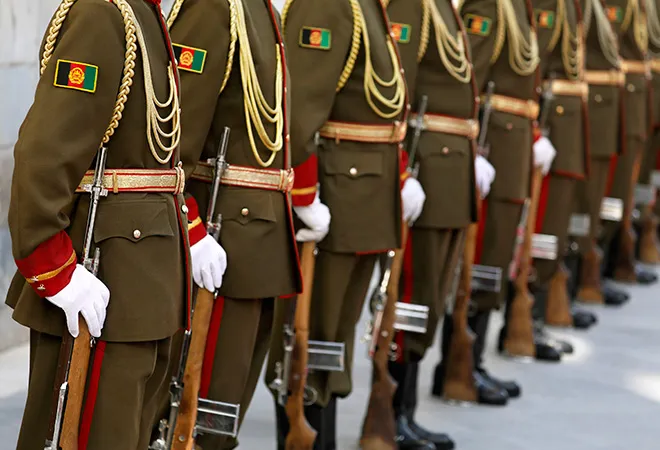-
CENTRES
Progammes & Centres
Location

The Taliban are at the table and everyone is hesitant to give them a seat. For nearly 18 years, the United States have been at war with the Taliban, fighting alongside the Afghan forces in a war that has cost them over a $ 1 trillion. They have been unable to win that war, given their inability to militarily defeat the group. The two sides stuck in the stalemate, now find themselves, talking to one another on the condition that the United States leaves and never comes back.
Diplomacy is complex and in Afghanistan, the process is complicated further by the domestic political squabbles, the involvement of regional countries and the inability of the United States to learn from their past mistakes.
If we can learn anything from the history of the US stay in Afghanistan, it is that the loss of US interest has always led to an increase in insurgent activity. This was the case when the Soviet Union collapsed and the US, deciding the battle against communism was won, lost interest in Afghanistan, leaving the Mujahedeen well-armed and trained. Even after returning to Afghanistan in 2001, to defeat the same Mujahedeen they helped arm a decade earlier, the US enmeshed in Iraq as well, continue to supply Pakistan with the money they ‘needed’ to fight the Taliban. With the US attention focused on Iraq, Pakistan helped the Taliban regroup and carry out attacks across Afghanistan. Once Washington realised that the Taliban had made their comeback, it was too late and violence across the country was rampant. President Obama’s announcement of a US drawdown and exit from the country by the end of 2011 was ill conceived. It allowed the Taliban and its friends in Pakistan to wait and bide their time. Now, history stands a chance to repeat itself. President Trump, desperate for a foreign policy ‘win’ is committed to bringing US troops home and is unlikely to back down.
For all the talk and political rhetoric on how peace negotiations should be “Afghan-led and Afghan-owned”, the US is a doing a poor job in ensuring the same. The Taliban have refused to negotiate with the present Ashraf Ghani government, viewing the Kabul government as a ‘puppet’ government of the US and therefore illegitimate.
The ongoing talks in Moscow between a number of government officials, senior politicians, including former president Hamid Karzai and the Taliban, are devoid of any representation by the current Ghani administration. While the meetings will build on the momentum of the earlier talks in Qatar, the failure of the US, the Afghan delegation and Moscow to reiterate the necessity of including the current government is extremely concerning. Everyone wants to advance their own political interests (in the case of the Afghan politicians attending) and their own strategic interests (in the case of other regional nations attending), without practicing what they preach. An ‘Afghan-led and Afghan-owned’ negotiations means, that the present government (irrespective of their flaws) needs to have a seat at the table. It shows the Taliban that the government is legitimate actor and whether or not, they like it, the government of Afghanistan has a say as well.
Another notable absence from the negotiations has been Afghan women. During Taliban rule from 1996 to 2001, women in Afghanistan were banned from schools, universities and having a job, many faced public beatings and executions with restrictions on where they could go. The Taliban have shown no inclination that their views on women have changed or have altered. In fact, the group’s statement in Moscow reflects their regressive views, as they attribute women’s rights to the “dissemination of western and non-Afghan and non-Islamic drama serials”. Decades of research and literature on the ending violent conflicts and countering violent extremism, stress the importance of having women at the negotiating table and a part of the formal peace process. There is growing body of evidence that shows that higher levels of gender equality are associated with lower propensity for conflict, and that women’s participation in conflict prevention and resolution advances security interests. Despite these facts, only three Afghan women were part of the delegation that visited Moscow.
While the negotiations are still in the beginning stages, and it will be months, maybe years before a final agreement is signed, these early developments should not be dismissed as ‘temporary’ or ‘preliminary’. The tone that the US and Afghan officials set now will go a long way in getting the best possible deal for the country. Last month, the US media was quick to praise a draft framework that confirmed the issue of US troop withdrawal in exchange for a Taliban promise that Afghan soil would never be used to harbor terrorist networks. It is concerning that all the Taliban needed to do, to get the US to leave, was to agree to never let foreign groups use Afghan territory to launch attacks. Taliban leaders have repeatedly over the years voiced their realization that harboring al-Qaeda after 9/11 was a mistake. Today, the Taliban is in direct conflict with the Islamic State Khorasan, and yet the US believe that asking the Taliban to not support terrorists is a first step.
The Taliban are finally ready to talk and the United States should take the opportunity set the tone and priorities. These must include zero compromise on women rights, ensuring that they meet international standards are not dictated by Islamic-law or “Afghan culture”.
It is important to discuss and set red lines on what the nature of the Afghan armed forces should be, who would control national resources and drug routes, what would happen to the thousands of internally displaced people and persecuted minorities in the country and most importantly what mechanism can be devised that holds the Taliban accountable for the promises they make. It is easy to declare that that there should be no interference of foreign countries in Afghanistan’s internal affairs, but it will take real diplomatic skill, political courage (and logical thinking) to ensure that this message gets driven through to Pakistan. Failure to do so, would mean that the US has registered their worst possible defeat, at the expense of the country they pledged to fix. The Taliban are at the table and they should be told where the Afghan people want them to sit.
The views expressed above belong to the author(s). ORF research and analyses now available on Telegram! Click here to access our curated content — blogs, longforms and interviews.

Kriti M. Shah was Associate Fellow with the Strategic Studies Programme at ORF. Her research primarily focusses on Afghanistan and Pakistan where she studies their ...
Read More +